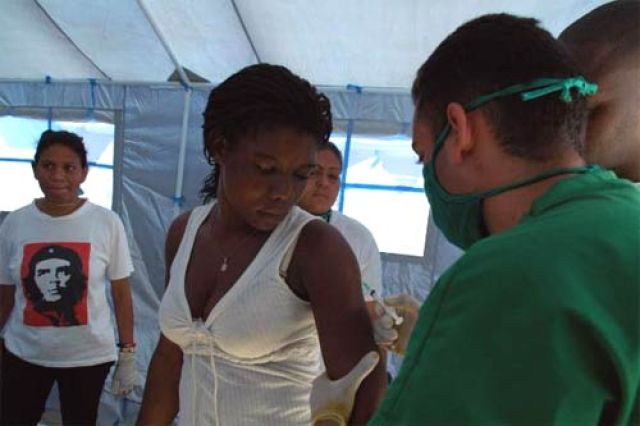
The Big Truck That Went By, How the World Came to Save Haiti and left Behind a Disaster
By Jonathan M. Katz
Palgrave Macmillan, 2013
282 pp., $24.95
On January 12, 2010, Haiti, one of the poorest countries in the world, was devastated by a huge earthquake.
Death toll estimates range from between 100,000 to more than 300,000. Nobody really knows, because Haiti was poorly governed beforehand and virtually taken over by foreign governments and non-government organisations (NGOs) afterwards.
The foreigners came with wads of money, promises to help and international pressure to get their help accepted on their terms. What was a mess before was made a disaster by their machinations. In the end, it was US interests that came out on top.
Associated Press reporter Jonathan Katz, stationed in the Haitian capital Port-au-Prince, lived through the quake and reported the aftermath.
Katz was present at many key events, such as the United Nations aid donors’ conference in New York. At that event, the Haitian people were represented by one speaker, who was given seven minutes to speak on behalf of the whole nation.
The speaker said that Haitians wanted their entire nation to benefit from reconstruction and that the work should reinforce self-sufficiency and sovereignty.
Unfortunately for Haiti, former US president Bill Clinton was chairing the meeting and gave precedence to American businessperson Brad Horwitz, owner of Haiti’s second biggest mobile phone company.
What was Horwitz’s wish list? Tax breaks, a slice of the aid money for business and the privatisation of state enterprises. “We need Haiti open for business,” he said in an eerie prequel to Tony Abbott’s election night victory speech.
What would this capitalist dream world be built on? On the cheap labour of Haitian garment workers toiling on a minimum wage of US$1.75 per day. The World Bank’s definition of moderate poverty is $2.00 a day and extreme poverty $1.25.
Only “Slick Willy” Clinton could believe that what he was selling was anything but a calamity for Haiti. This is what Naomi Klein has called “the Shock Doctrine” — taking advantage of a disorienting situation to drive through a pro-corporate neoliberal agenda.
Clinton’s job was to make sure that international donors actually delivered on their pledges and, in breach of Haitian sovereignty, oversee the spending of it. He failed miserably but basked in many photo opportunities.
Along the way a pro-US, right-wing president was manoeuvred into power in Haiti in some shady dealings with US fingerprints all over them.
Katz is a very good writer, weaving many personal stories through his account. These help illustrate the hardship Haitians endured and the agonising personal choices they had to make.
He paints the picture well of the myriad of highly paid aid workers, living in gated compounds and being ferried to their work in armed convoys.
Not only did the Haitians have to endure their national dignity being violated, they were slandered by the international expectation that they would riot and attack the aid workers. That was the pretext for the US moving first to militarily secure its bases.
Aid workers lived in a world of their own, Katz says, isolated from and uncomprehending of Haiti’s needs and ignorant of Haitians’ capabilities. Many activities, such as delivering food inappropriately, destroyed the economic basis of Haitian agriculture, making Haitians more dependent on foreign aid than ever.
The insanity of the NGOs uncoordinated efforts was exposed when Nepalese UN peacekeeping troops introduced cholera into the country, at the cost of 5000 lives. Not present in Haiti before, cholera is now endemic.
NGOs were intent on simply giving aid, indifferent to developing a working health system.
This last point raises a question about Katz’s reporting. There was actually those working outside the NGO scrum, doing exemplary disaster relief and developing a Haitian medical system. Yet they are invisible in this book.
Under the headline “Cuban medics in Haiti put the world to shame”, the December 26, 2010 London Independent said that “Castro's doctors and nurses are the backbone of the fight against cholera”.
The article quoted Canadian academic John Kirk saying: “Cuba's contribution in Haiti is like the world's greatest secret. They are barely mentioned, even though they are doing much of the heavy lifting.”
The Cubans method of operation is part of the secret of their success. They live in and among the slum camps without armed guards, not in the artificial glitz of other NGOs.
More than that, Cuba has trained hundreds of Haitian doctors for free as part of establishing a resilient health care system, capable of surviving both natural and economic calamities.
Why all of this should be absent from Katz’s account is perplexing. Was Katz himself so enveloped in the NGO bubble world that he just didn’t see the Cubans, the largest foreign contingent during the cholera epidemic, with their 40 medical centres, treating tens of thousands of victims?
Or is Katz yet another American liberal who can point to the failures of neoliberal imperialism, but not to those offering an alternative? If so, he needs to learn that liberal imperialism is no better than the neocon shock doctrine variety.
On a more personal note, I learned from this book that Bill and Hillary Clinton honeymooned in Haiti after their 1975 wedding, around the same time that I was there, during the reign of Baby Doc Duvalier.
Bill Clinton says that, faced with the poverty around him, he experienced a kind of epiphany and decided on the political path that has created the man that we all know so well.
At the same time, I was killing time in Port-au-Prince with a visa glitch that had me facing time in a Haitian gaol and deportation. One night at a party, I met a Haitian novelist who showed me his book, Crise-Coeur, which is French for heart attack, but which he explained meant grieving or heartbreak.
“Until you understand crise-coeur,” he told me, “you will never understand this country.”
